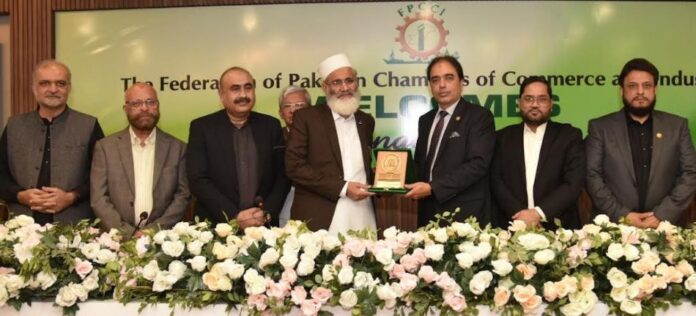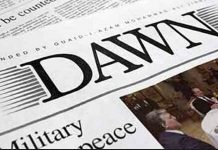Karachi, JAN 27 (DNA): Saquib Fayyaz Magoon, Acting President FPCCI, has appreciated that the Ameer of Jamaat-e-Islami (JI), Senator Siraj Ul Haq, has visited the head office of the apex body to present their economic manifesto; business and infrastructure development plan to the business, industry and trade community. He added that the political parties should consult FPCCI before formulating their economic policies for their manifestos as the business community can provide them with the right grass-root level information.
Mr. Saquib Fayyaz Magoon, Acting President FPCCI, has requested all political parties to present their economic manifestos to the apex body based on practical, detailed and duly planned manner as the business community is only looking to listen to solutions not the rhetoric. We need to understand how the political parties are planning to reduce the cost of doing business; how the obstacles in ease of doing business will be eliminated; how skills development gaps will be bridged; how much will be budgeted for health & education; how SOEs losses will be minimized; how the tax gap of 4,000 billion will be bridged & tax base broadened and how the platform of SIFC will be fully utilized by the upcoming government.
Mr. Saquib Fayyaz Magoon acknowledged that revising the contracts with independent power producers (IPPs) – as mentioned in JI’s manifesto – is the need of the hour; however, he emphasized that it should be done through a consultative process to avoid any litigation at national or international forum. The circular debt of the energy sector now stands at an unprecedented and alarming PKR. 5.731 trillion, he added.
Acting FPCCI Chief proposed that the new government should prioritize the structural and macroeconomic issues like reduction in SBP’s key policy rate to make access to finance from commercial banks possible for SMEs; reduction in cost of doing business through rationalizing electricity and gas prices to make it competitive regionally and ensuring consultation, continuity and alignment in economic, fiscal, industrial, trade, agricultural, infrastructure & development, information technology, SMEs and taxation policies.
Senator Siraj Ul Haq, Ameer of Jamaat-e-Islami, said that his party intends to provide free electricity to the poor for up to 300 units; collecting zakat from 750 million people in Pakistan and distribute that to the lower income 750 million people in the country. Additionally, defense spending should be discussed and consulted with the parliament.
Mr. Siraj Ul Haq explained that their financial system will be riba-free and based on the collection of Zakat & Ushr. The priorities for governmental spending will be welfare first, then developmental expenditure and administrative expenses should be the third largest head, he added.
On rising electricity prices, Mr. Siraj Ul Haq, said that Pakistan has coal reserves worth $25 trillion and sufficient for 300 years; why cannot we utilize our indigenous resources to address our economic issues? Additionally, Pakistan suffers theft and T&D losses of PKR. 500 every year; while the neighboring China has no such losses. He also mentioned that 70 percent owners of IPPs are Pakistani nationals and they can be persuaded to renegotiate their contracts in the national interest.
JI Chief also expressed his profound concerns that 28 million children are out of schools in Pakistan; 9 million people are drug addicts; per acre agricultural yield is one third of the real potential and economic growth rate is only 0.3 percent. Jamaat-e-Islami has 1,200 PhDs in its team; who are experts of their fields including economics and finance, he added.

















